

European Parliament unites against 3 strikes, ACTA secrecy. New ACTA leak shows major resistance to US-style DRM rules. European Parliament unites against 3 strikes, ACTA secrecy. Europe trashes ACTA as Obama praises it. Earlier this week, we noted that the major parties in the European Parliament had all agreed on a resolution trashing the Anti-Counterfeiting Trade Agreement (ACTA) and the secret process that has been hashing it out.
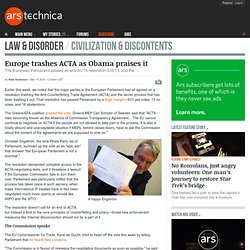
That resolution has passed Parliament by a huge margin—633 yes votes, 13 no votes, and 16 abstentions. Your life will some day end; ACTA will live on. The Anti-Counterfeiting Trade Agreement (ACTA) isn't just another secret treaty—it's a way of life.
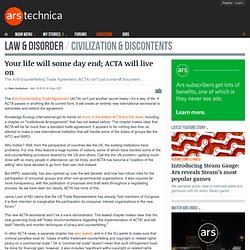
If ACTA passes in anything like its current form, it will create an entirely new international secretariat to administer and extend the agreement. Knowledge Ecology International got its hands on more of the leaked ACTA text this week, including a chapter on "Institutional Arrangements" that has not leaked before. The chapter makes clear that ACTA will be far more than a standard trade agreement; it appears to be nothing less than an attempt to make a new international institution that will handle some of the duties of groups like the WTO and WIPO.
Why bother? Harvard profs trash ACTA, demand oversight, threaten lawsuit. Harvard Law School professors Lawrence Lessig and Jack Goldsmith took to the op-ed page of the Washington Post today to slam the Obama administration's approach to the Anti-Counterfeiting Trade Agreement (ACTA)—and to threaten a lawsuit if ACTA is signed without Congressional oversight.

The US has positioned ACTA as an executive agreement rather than a treaty. Such a move means that ACTA doesn't need Senate approval, but it also means that the agreement should not alter US law, either. If you want to change the law, you go to Congress. ACTA arrives (and it's gotten a tiny bit better) We've been covering the Anti-Counterfeiting Trade Agreement (ACTA) for two years now, and in that entire 24 month period no official text of the agreement has been released.

Remarkable, really, given the intense scrutiny, but there you have it. Today, that all changed as the countries behind ACTA finally released a consolidated draft text (PDF) of the agreement. Though billed as a "trade agreement" about "counterfeiting," ACTA is much more than that: it's an intellectual property treaty in disguise. Praising, cursing ACTA: reactions roll in. Ars has already dived deep into the bowels of the Anti-Counterfeiting Trade Agreement (ACTA), and our findings were about as pretty as that metaphor suggests.

The agreement has already been improved under public pressure, so what's the broader reaction to its release? We rounded up some of the most interesting reactions. If you want a sense of how the debate over ACTA will play out over the rest of this year, consider these talking points a sneak preview. Cyber Privacy Act not specific enough, opens door to abuse. No one likes having their personal information posted online by someone else, and a new bill introduced by House Representative Thaddeus McCotter (R-MI) aims to give users a way to send DMCA-like takedowns in order to get it removed.
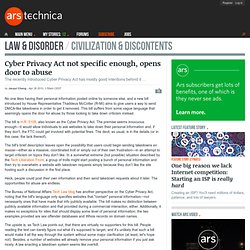
This bill suffers from some vague language that seemingly opens the door for abuse by those looking to take down criticism instead. The bill is H.R. 5108, also known as the Cyber Privacy Act. The premise seems innocuous enough—it would allow individuals to ask websites to take down their personal information and, if they don't, the FTC could get involved with potential fines.
Net neutrality: would it have killed the iPhone? Now here's an interesting claim: had net neutrality been the law of the land several years back, we might not have the iPhone.
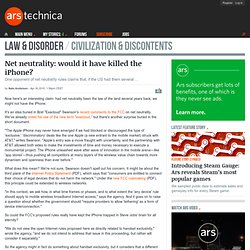
It's an idea buried in Bret "Exacloud" Swanson's recent comments to the FCC on net neutrality. We've already noted his use of the new term "exacloud," but there's another surprise buried in the short document. "The Apple iPhone may never have emerged if we had blocked or discouraged the type of 'exclusive,' 'discriminatory' deals like the one Apple (a new entrant to the mobile market) struck with AT&T," writes Swanson.
"Apple’s entry was a move fraught with uncertainty, and the partnership with AT&T allowed both sides to make the investments of time and money necessary to execute a monumental project. The iPhone unleashed wave after wave of innovation in the mobile arena—like 'app stores'—thus pushing all competitors at many layers of the wireless value chain towards more dynamism and openness than ever before. " AT&T wants 3 strikes tribunal, government website blacklist.
Pop quiz: what organization recently provided the following quotes on "graduated response" to the White House's Intellectual Property Enforcement Coordinator, Victoria Espinel?
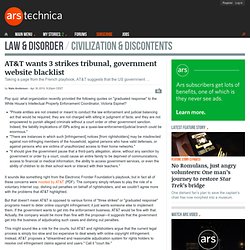
"Private entities are not created or meant to conduct the law enforcement and judicial balancing act that would be required; they are not charged with sitting in judgment of facts; and they are not empowered to punish alleged criminals without a court order or other government sanction. Indeed, the liability implications of ISPs acting as a quasi-law-enforcement/judicial branch could be enormous. " "There are instances in which such [infringement] notices [from rightsholders] may be misdirected against non-infringing members of the household, against persons who have valid defenses, or against persons who are victims of unauthorized access to their home networks. " It sounds like something right from the Electronic Frontier Foundation's playbook, but in fact all of these concerns were mooted by AT&T (PDF).
Senators: 'Net privacy law for children in need of overhaul. Speaking before a Senate Commerce Committee hearing, Chair Jay Rockefeller (D-WV) warned that Congress needs to take a "hard look" at whether the nation's privacy law for children on Internet sites "should be updated to cover new kinds of information and new businesses.
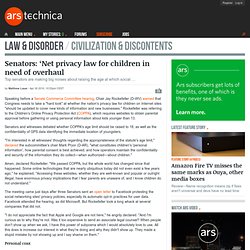
" Rockefeller was referring to the Children's Online Privacy Protection Act (COPPA), which requires websites to obtain parental approval before gathering or using personal information about kids younger than 13. Senators and witnesses debated whether COPPA's age limit should be raised to 18, as well as the confidentiality of GPS data identifying the immediate location of youngsters. Amen, declared Rockefeller. "We passed COPPA, but the whole world has changed since that happened. Is it high noon for net neutrality at the FCC? The net neutrality troops are up in arms over a Washington Post report suggesting that the Federal Communications Commission wants to throw in the towel, more or less, when it comes to regulating ISPs like Comcast.
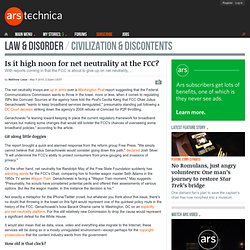
Sources at the agency have told the Post's Cecilia Kang that FCC Chair Julius Genachowski "wants to keep broadband services deregulated," presumably standing pat following a DC Court decision striking down the agency's 2008 rebuke of Comcast for P2P throttling. Genachowski "is leaning toward keeping in place the current regulatory framework for broadband services but making some changes that would still bolster the FCC's chances of overseeing some broadband policies," according to the article. New privacy bill makes your location, sexual orientation "sensit. Major Internet privacy legislation was unveiled today (PDF) by Rep. Rick Boucher (D-VA) and Rep. Cliff Stearns (R-FL).
FCC gives Hollywood control over your home theater. After almost two years of deliberation, the Federal Communications Commission has granted Hollywood and cable companies permission to shut down analog streams to HDTV equipped home theaters. The geek term for this is "selectable output control" (SOC)—until now forbidden by the FCC. The Motion Picture Association of America requested a waiver on the SOC ban in May of 2008, arguing that without it, Hollywood studios could not securely offer consumers pre-DVD released movies on television. 73 Democrats tell FCC: drop net neutrality rules. A slew of House Democrats have sent a letter to the Federal Communications Commission warning the agency not to go forward with its plan to partially reclassify ISPs as common carriers, a move needed to impose net neutrality rules. "The uncertainty this proposal creates will jeopardize jobs and deter needed investment for years to come," wrote Texas Congressman Gene Green on Monday.
"The significant regulatory impact of reclassifying broadband service is not something that should be taken lightly and should not be done without additional direction from Congress. "